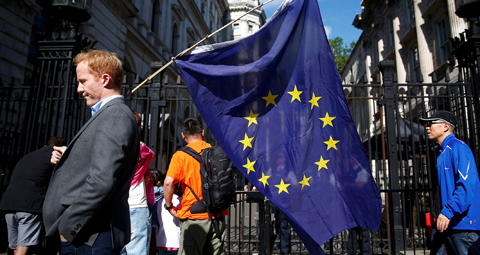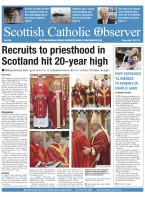April 13 | ![]() 0 COMMENTS
0 COMMENTS ![]() print
print

It’s time to register your status
Immigration lawyer Jamie Kerr urges European Catholics living in Scotland to make sure their legal status here is secure.
WITH the Prime Minister, Theresa May, now having formally triggered Article 50, the UK is well on the way to leaving the European Union (EU). This has created much debate about the impact on European nationals already living in Scotland and this debate is one that is of very real interest to the Catholic community in Scotland.
With official statistics showing that more than half of all EU nationals living in Scotland identify as Roman Catholic, it is essential that the impact of Brexit in this regard is fully understood by our community. Since the enlargement of the EU in 2004, there has been a greater awareness amongst many of the impact that recent migration from continental Europe has had on our domestic Church here in Scotland.
The Polish are a good example of this. Almost every diocese now offers weekly Masses in Polish and these are packed full of young families. We have Polish-speaking priests, initially coming over to look after the needs of the Polish community, though we now find them running parishes and acting as chaplains to our schools and hospitals.
When we think of EU migration, it is far too easy to forget that when it comes to Brexit bringing uncertainty over the continued residence of EU nationals in Scotland, the impact reaches far beyond the newly arrived Eastern European communities.
The same uncertainty also extends in equal measure to the Spanish, Italian, French, Maltese and even Irish nationals living and working in Scotland.
Many will have been here for decades, though the reality of Brexit is that when it comes to residency rights for EU nationals, there is no distinction between nationals of any of the EU countries. The vast majority of EU nationals living in Scotland do so without a visa. This is because European free movement law allows them to do so. When the UK leaves the EU, the existing free movement rights of all EU nationals to live, work and study anywhere in the EU without the need for a visa will end.
Most people take the view that after Brexit, there will be some form of system in place that will restrict the flow of migrants from mainland Europe. That is probably correct, though we do not yet know what form the new rules might take.
Perhaps migrants will need a job offer before they come to the UK; perhaps they will need to be highly skilled; or perhaps there might be a points system. No one is quite clear.
What is clear is that there will be a system in place for EU nationals after Brexit which is different to what we have at the moment.
A new system means that those EU nationals already living in Scotland and to whom the new rules might not apply, will likely struggle to prove their residency and legal rights to live and work in the UK. For the most part, EU nationals resident in Scotland have EU passports with no UK visas or residency stamps in them. In fact most have no official paperwork to show that they have the right to live here.
EU nationals would therefore be well advised to apply to the UK Home Office for paperwork certifying their continued right of residence in the UK. For those who have been living in Scotland for five years or less, they should apply for a Registration Certificate.
For those who have been living in Scotland for five years or longer, it would be worth checking eligibility for a Permanent Residence Card.
Some who have lived in the UK for six years or more might also be eligible for British nationality (usually in addition to their existing nationality) which is the best form of protection from Brexit. The process of registering residency status can have some complications, though for the vast majority of people it will be relatively straightforward. EU nationals should be taking the necessary steps to formally register their status regardless of whether they have been in Scotland for four months, four years or 44 years.
Jamie Kerr is a specialist immigration lawyer at Thorntons Solicitors and a parishioner at St Francis Xavier’s parish in Carfin.











